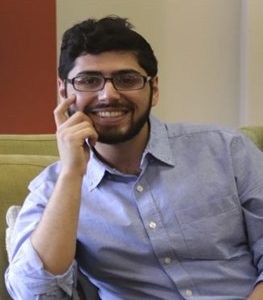March 17, 2017

An Iranian-American living deep in Trump country has just been given the Vanguard Agriculture Design award by West Virginia for an invention that grows fungi that can replace Styrofoam as packing material.
“When I was 8 or 9 years old, I was interested in cameras and how light works,” says Nima Shahab Shahmir, who lives in Lewisburg, West Virginia, where his name makes him stand out. “Then, my father introduced me to computers because he was interested in them. I’d take them apart and put them back together again.”
Now a college sophomore majoring in computer science, the 23-year-old has put together a process to transform mushroom mycelium (root-like structures) into sustainable packaging material. This “Future Fungi” process can grow organic recyclable materials in just two weeks.
As the winner of the Vanguard Ag Design award for his invention, Shahab Shahmir will receive more than $10,000 in business assistance from the Robert C. Byrd Institute (RCBI), which sponsors the annual competition to recognize innovation in agriculture.
His success as a budding inventor “was meant to be,” he told the Register-Herald in Beckley, West Virginia.
The same might well be said about his move to West Virginia from Iran with his parents seven years ago, capping a 16-year immigration process that began when Nima was just a baby. At the time, brothers of both of his parents already lived in America.
When permission was finally granted for the family to come to the United States, Shahab Shahmir says, “We had two options.” The family could either go with his father’s brother in California or relocate to Lewisburg, where his mother’s brother lives.
Seeking a permanent home in America, the family chose Lewisburg, preferring a small town to the atmosphere they were used to in Tehran. Lewisburg doesn’t even have 4,000 people.
“I missed the city at first; I was homesick,” Shahab Shahmir admits. “But after years passed, I realized I don’t want the stress of a large city. It’s great living here. You’re close to nature; you can breathe. And the people are so friendly. It’s like a big family here.”
The young man’s schooling has also been quite different since arriving in America.
“Iran schools are much more difficult — focused on science and math,” he said. “I finished my freshman year [of high school] there, and when I came here, they assigned me as a junior. But the opportunities here, you can’t compare. I’m just very fortunate to have this oppor-tunity. The amount of freedom that you have in the US is amazing.”
His father is a chef at The General Lewis Inn and his mother is known as “The Persian Baker” at the Lewisburg Farmers Market.
After obtaining an associate degree at New River Community and Technical College, Shahab Shahmir went on to the West Virginia University of Technology in Montgomery to pursue a bachelor’s degree in computer science, only to find not all of his New River credits would transfer. Instead of being disheartened by the setback, he proceeded to work on the Future Fungi project, with the encouragement of his business coach and, now, the award funds.
“Others have worked on similar projects, but what makes mine unique and innovative is that the end result can be used to replace plastic and Styrofoam in a practical way,” he said. “It’s a vast field, and there are numerous applications.”
In addition to granting the project a cash prize, the award will assist Shahab Shahmir for the next year with product design and development; logo creation and marketing; patent, trademark and copyright applications; business development planning; funding opportunities and business incubator space.
Without revealing any of his trade secrets, the young businessman explains that the fast-growing mushroom mycelium are formed into the desired shape — perhaps a cup or plate or block — in a mold and baked at a high temperature. The resulting product is lightweight, fireproof, waterproof and still edible, Shahab Shahmir said.
While many shapes and products are possible, the inventor is focusing his attention at the outset on creating a type of shipping material that can replace “packing peanuts” — those ubiquitous Styrofoam nuggets that cushion the fragile contents of boxes in transit all over the world.
“Nature can’t degrade Styrofoam,” Shahab Shahmir points out. “They take between 100 and 400 years to biodegrade, and they will have an impact on the environment and on humans during that period.”
In addition to using mushroom mycelium, Shahab Shahmir says he will also incorporate cornhusks and corn stalks in his all-natural packing material. The entire process to make a batch of the material takes around two weeks to complete, he said.
And, unlike expanded polystyrene (Styrofoam) or other nonbiodegradable plastics, Future Fungi can easily be returned to nature.
“You can put it back in your garden when you’re finished with it,” Shahab Shahmir said. And just as it takes 14 days to create, it also takes 14 days to return to nature and enrich the soil.
